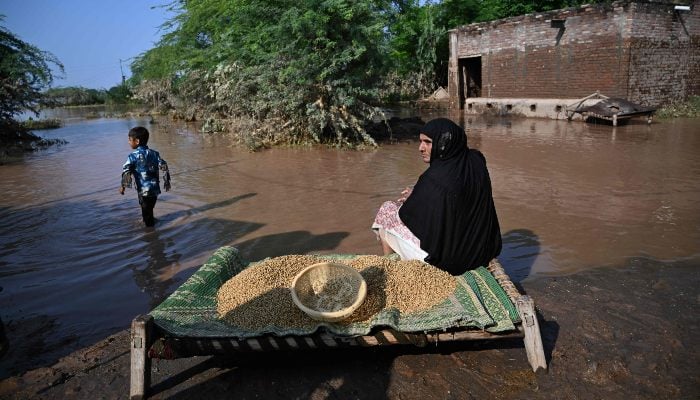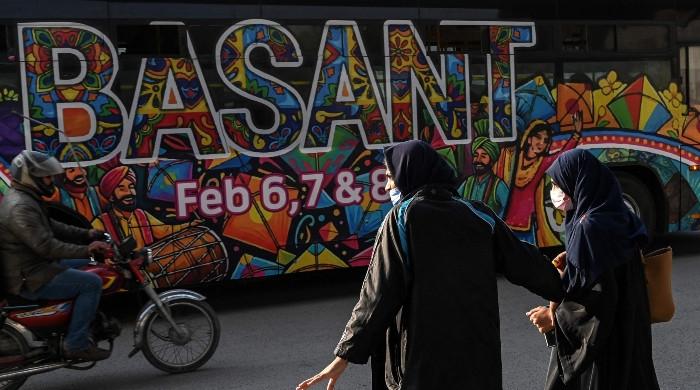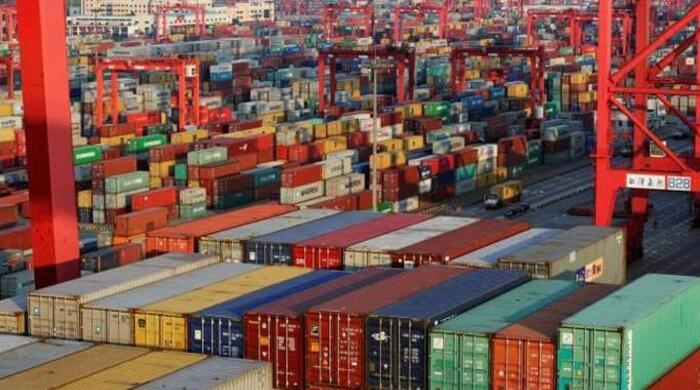Gendered toll of floods
Without decisive action, each new disaster will drown the same women twice — first in floodwaters and then in neglect
August 29, 2025

Pakistan’s 2025 monsoon floods have once again unleashed a humanitarian disaster — and once again, women and girls are bearing an outsized burden.
Reproductive healthcare has emerged as a critical casualty. According to the UNFPA, 650,000 pregnant women were among those affected by the last major floods in 2022, all needing maternal services. This year’s crisis is likely following the same trajectory, with tens of thousands of expectant mothers again cut off from clinics and midwives.
Health officials warn that disasters like these sharply increase the risks of maternal and infant mortality. The UNFPA reported in 2022 that Pakistan’s baseline maternal mortality rate stood at 186 deaths per 100,000 live births nationally, rising to 224 in Sindh and 298 in Balochistan.
The UNFPA documented in 2022 how expectant mothers travelled for hours by boat to deliver babies safely. At the time, the agency warned that the damage to infrastructure was unimaginable, putting the lives of pregnant women at great risk. That warning has returned with force in 2025, as health systems once again collapse under the strain of the monsoon.
Displacement has compounded women’s safety risks. Crowded relief camps and improvised shelters offer little privacy or security, leaving women and girls highly vulnerable. Families crammed into tents often force women to forgo personal safety to care for children and elders. In earlier disasters, women reported no separate food distribution centres or segregated toilets, making relief camps unsafe and undignified. Despite repeated warnings, these basic measures remain largely absent in 2025.
Food insecurity, too, is intensifying the crisis. Across flood-hit farming regions, women manage household food supplies and livestock – resources now wiped out by the deluge. After the 2022 floods, a UN assessment warned that 500,000 people were ‘one step away’ from catastrophic food insecurity.
Aid workers reported desperate families keeping ‘a pot on the stove just to tell their children something is cooking’ when no food was available. Yet by late 2024, the World Food Programme had received only 19% of the required funding for Pakistan’s recovery, leaving millions without adequate assistance. This hidden hunger is unfolding again in 2025.
Such gendered effects are not incidental but a result of systemic policy failure. Women are not involved in the decision-making processes regarding disaster governance, even though they are among the most climate-vulnerable groups in the world. Pakistan is the lowest-ranked country in the world in relation to parity between the genders as per the World Economic Forum’s Global Gender Gap Index 2025. The results of this exclusion are fatal.
Local activists point to the fact that the limited mobility of rural women, as many cannot swim or leave without male permission, leaves them trapped when flash floods strike. Women and girls around the globe are 14 times more likely to die in the face of natural disasters compared to their male counterparts, and this situation is starkly visible in Pakistan.
Pakistan must implement gender-responsive disaster policies to avoid occurrences of such failures in the future. Budgets should prioritise the needs of women, such as the financing of maternal care, mobile clinics and emergency medicines. Food distribution systems must have dedicated, safe queues for women along with nutritious rations, especially for pregnant and lactating mothers.
Women should also be involved in planning and leadership roles in local-level relief committees and national-level climate policymaking, to ensure that strategies align with the realities on the ground. Countries such as the Philippines have requirements that 5% of disaster budgets be directed to gender-sensitive programmes; Pakistan needs to follow suit and translate its commitment into action.
GBV protections have to be embedded in relief camps via secure sanitation, female security personnel and confidential survivor services. In addition, direct access for women to aid like Watan cards or cash transfers reduces the vulnerability and exploitation of women in times of emergency.
The 2025 floods are a warning that climate change deepens existing inequalities unless policies evolve. Women have shown extraordinary resilience, but they should not bear the brunt of each catastrophe. According to the UNDP, empowering women in disaster response is crucial to strengthening national resilience. Addressing gendered vulnerabilities will save lives, make aid more effective and ensure recovery.
Pakistan must act urgently to reform domestic policies, and international partners must honour their climate finance promises. The monsoon may be beyond control, but priorities are not. Without decisive action, each new disaster will drown the same women twice — first in floodwaters and then in neglect.
The writer is a freelance contributor.
Disclaimer: The viewpoints expressed in this piece are the writer's own and don't necessarily reflect Geo.tv's editorial policy.
Originally published in The News











